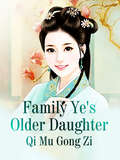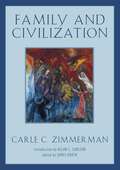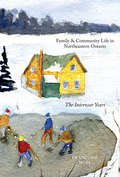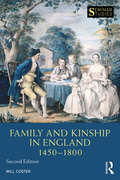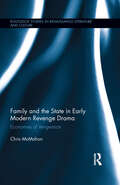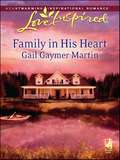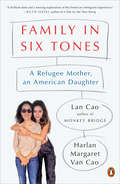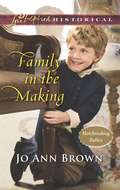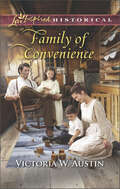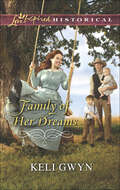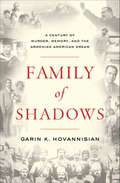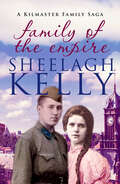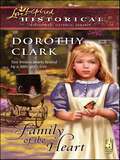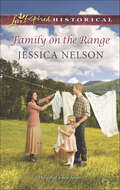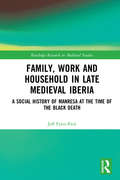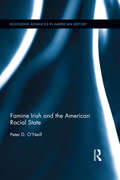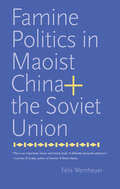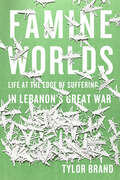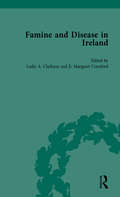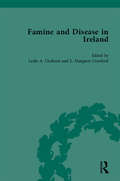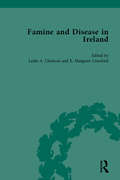- Table View
- List View
Family Ye's Older Daughter: Volume 4 (Volume 4 #4)
by Qi MuGongZiYe Qimu, the president of an international group, had been struggling for so many years, but suddenly found out that he was terminally ill, or had been pitied by the heavens. He had actually traveled to a little girl from a rundown village in the Empire of Donghua, and in ancient times, his parents and siblings had been working all day and were all thin and yellow? She went alone up the mountain to look for food! Grandmother will squeeze it? She designed a branch family! The Zhuang family's aunt was a nice person, yet she sent him an egg? With a wave of his hand, he formed a gang and became rich! Who said that the sons and daughters of the peasants were the lowest? However, she was a bookseller, and business was a windfall. She had a handsome genius behind her, and he was determined to support her! Furthermore, the Ye Clan's daughter was full of admiration for him. She bore the heavy responsibility and was like a lotus blooming every step of the way. There would always be something wonderful about her! Join Collection
Family Ye's Older Daughter: Volume 5 (Volume 5 #5)
by Qi MuGongZiYe Qimu, the president of an international group, had been struggling for so many years, but suddenly found out that he was terminally ill, or had been pitied by the heavens. He had actually traveled to a little girl from a rundown village in the Empire of Donghua, and in ancient times, his parents and siblings had been working all day and were all thin and yellow? She went alone up the mountain to look for food! Grandmother will squeeze it? She designed a branch family! The Zhuang family's aunt was a nice person, yet she sent him an egg? With a wave of his hand, he formed a gang and became rich! Who said that the sons and daughters of the peasants were the lowest? However, she was a bookseller, and business was a windfall. She had a handsome genius behind her, and he was determined to support her! Furthermore, the Ye Clan's daughter was full of admiration for him. She bore the heavy responsibility and was like a lotus blooming every step of the way. There would always be something wonderful about her! Join Collection
Family Ye's Older Daughter: Volume 6 (Volume 6 #6)
by Qi MuGongZiYe Qimu, the president of an international group, had been struggling for so many years, but suddenly found out that he was terminally ill, or had been pitied by the heavens. He had actually traveled to a little girl from a rundown village in the Empire of Donghua, and in ancient times, his parents and siblings had been working all day and were all thin and yellow? She went alone up the mountain to look for food! Grandmother will squeeze it? She designed a branch family! The Zhuang family's aunt was a nice person, yet she sent him an egg? With a wave of his hand, he formed a gang and became rich! Who said that the sons and daughters of the peasants were the lowest? However, she was a bookseller, and business was a windfall. She had a handsome genius behind her, and he was determined to support her! Furthermore, the Ye Clan's daughter was full of admiration for him. She bore the heavy responsibility and was like a lotus blooming every step of the way. There would always be something wonderful about her! Join Collection
Family Ye's Older Daughter: Volume 7 (Volume 7 #7)
by Qi MuGongZiYe Qimu, the president of an international group, had been struggling for so many years, but suddenly found out that he was terminally ill, or had been pitied by the heavens. He had actually traveled to a little girl from a rundown village in the Empire of Donghua, and in ancient times, his parents and siblings had been working all day and were all thin and yellow? She went alone up the mountain to look for food! Grandmother will squeeze it? She designed a branch family! The Zhuang family's aunt was a nice person, yet she sent him an egg? With a wave of his hand, he formed a gang and became rich! Who said that the sons and daughters of the peasants were the lowest? However, she was a bookseller, and business was a windfall. She had a handsome genius behind her, and he was determined to support her! Furthermore, the Ye Clan's daughter was full of admiration for him. She bore the heavy responsibility and was like a lotus blooming every step of the way. There would always be something wonderful about her! Join Collection
Family and Civilization
by Carle C. ZimmermanIn Family and Civilization, the distinguished Harvard sociologist Carle Zimmerman demonstrates the close and causal connections between the rise and fall of different types of families and the rise and fall of civilizations, particularly ancient Greece and Rome, medieval and modern Europe, and the United States. Zimmerman traces the evolution of family structure from tribes and clans to extended and large nuclear families to the smaller, often broken families of today. And he shows the consequences of each structure for bearing and rearing of children, for religion, law, and everyday life, and for the fate of civilization itself. Originally published in 1947, this compelling analysis predicted many of today's controversies and trends concerning youth violence and depression, abortion, and homosexuality, the demographic collapse of the West, and the displacement of peoples. This new edition has been edited and abridged by James Kurth of Swarthmore College. It includes essays on the text by Kurth and Bryce Christensen and an introduction by Allan C. Carlson.
Family and Community Life in Northeastern Ontario
by Françoise NoëlAn extensive series of interviews with local residents and a reconstruction of local news and events as chronicled in The Nugget newspaper, among other sources, allow Noël to bring to life the daily routines and celebrations that were a part of family life in rural and urban settings from Mattawa to North Bay. Family life was not lived in isolation, and she also reveals the rich community life that developed in shared social spaces like schools and churches, and through community groups. What people did for fun may have been frivolous but it was not trivial: accounts of shared leisure activities, popular sports, and community festivals such as Old Home Week provide important insights into the structure and value of community life.
Family and Community Life in Northeastern Ontario: The Interwar Years
by Françoise NoëlFrançoise Noël explores the social context of Canada’s most famous family to show how family ritual and communal events structured everyday life between the wars.
Family and Kinship in England 1450-1800 (Seminar Studies)
by Will CosterFamily and Kinship in England 1450-1800 guides the reader through the changing relationships that made up the nature of family life from the late medieval period to the beginnings of industrialisation. It gives a clear introduction to many of the intriguing areas of interest that this field of history has opened up, including childhood, youth, marriage, sexuality and death. This book introduces the elements that made up family life at different stages of its development, from creation to dissolution, and traces the degree to which family life in England changed throughout the early modern period. It also provides a valuable synthesis of the debates and research on the history of the family, highlighting the different ways historians have investigated the topic in the past. This new edition has been fully updated to incorporate the latest research on urban communities, emotions and interactions between the family and the parish, town and state. Supported by a range of compelling primary source documents, a glossary of terms, a chronology and a who’s who of key characters, this is an essential resource for any student of the history of the family.
Family and the State in Early Modern Revenge Drama: Economies of Vengeance (Routledge Studies in Renaissance Literature and Culture)
by Chris McMahonIn this book, McMahon considers Early Modern revenge plays from a political science perspective, paying particular attention to the construction of family and state institutions. Plays set for close study are The Spanish Tragedy, Hamlet, The Revenger’s Tragedy, The Malcontent and The Duchess of Malfi. The plays are read as unique events occupying positions in historical process concerning the privatisation of the family (by means of symbolism and concrete household strategies such as budgeting and surveillance) and the subsequent appropriation of the family and its methods by the state. The effect is that family becomes an unofficial organ of the state. This process, however, also involves the reform of the state along lines demanded by the private family. McMahon’s critical method, derived from the theory of Bourdieu, Bataille, and Girard, maps capital transactions to reveal emotionally charged, often idiosyncratic responses to issues of shared concern. Such issues include state corruption, the management of women, the performance of roles according to gender, the uses of surveillance, and the ethics of sacrifice.
Family in His Heart
by Gail Gaymer MartinWho Wasn't Trying To Fix Up Dr. Zack Hemingway?Even his boss had handpicked two of his three daughters as perfect candidates for the position of Zack's wife. But it was the other daughter who'd caught Zack's no-longer roving eye.A sweet Christian woman who worked with children in need, Chloe Kilgannon possessed everything he wanted in a wife. Except a willingness to say I do. Why? What was Chloe hiding-or hiding from? Zack had to find out before he lost Chloe for good. For when his own family dropped a life-changing bombshell on him, he knew that some secrets were truly meant to be shared.
Family in Six Tones: A Refugee Mother, an American Daughter
by Lan Cao Harlan Margaret Van Cao"A brilliant duet and a moving exploration of the American immigrant experience."--Ruth Ozeki, author of A Tale for the Time BeingA dual first-person memoir by the acclaimed Vietnamese-American novelist and her thoroughly American teenage daughterIn 1975, thirteen-year-old Lan Cao boarded an airplane in Saigon and got off in a world where she faced hosts she had not met before, a language she didn't speak, and food she didn't recognize, with the faint hope that she would be able to go home soon. Lan fought her way through confusion, and racism, to become a successful lawyer and novelist. Four decades later, she faced the biggest challenge in her life: raising her daughter Harlan--half Vietnamese by birth and 100 percent American teenager by inclination. In their lyrical joint memoir, told in alternating voices, mother and daughter cross ages and ethnicities to tackle the hardest questions about assimilation, aspiration, and family.Lan wrestles with her identities as not merely an immigrant but a refugee from an unpopular war. She has bigoted teachers who undermine her in the classroom and tormenting inner demons, but she does achieve--either despite or because of the work ethic and tight support of a traditional Vietnamese family struggling to get by in a small American town. Lan has ambitions, for herself, and for her daughter, but even as an adult feels tentative about her place in her adoptive country, and ventures through motherhood as if it is a foreign landscape.Reflecting and refracting her mother's narrative, Harlan fiercely describes the rites of passage of childhood and adolescence, filtered through the aftereffects of her family's history of war, tragedy, and migration. Harlan's struggle to make friends in high school challenges her mother to step back and let her daughter find her own way.Family in Six Tones speaks both to the unique struggles of refugees and to the universal tug-of-war between mothers and daughters. The journey of an immigrant--away from war and loss toward peace and a new life--and the journey of a mother raising a child to be secure and happy are both steep paths filled with detours and stumbling blocks. Through explosive fights and painful setbacks, mother and daughter search for a way to accept the past and face the future together.
Family in the Making
by Jo Ann BrownDaddy Lessonse Arthur, Lord Trelawney, is an expert at carrying coded messages for the government-and a complete amateur in caring for children. <P><P>Before courting a widowed acquaintance with two babies, he decides to practice with the rescued orphans sheltering at his family estate. A practical idea...until he meets their lovely nurse. Maris Oliver is drawn to the principled, handsome nobleman, even if he's expected to woo another woman. Both have secrets that threaten their safety and their fragile trust. But if Maris's sweet charges have their way, Arthur won't need to venture beyond his own front door to find a woman he'll risk all to protect and love. Matchmaking Babies: Seeking forever families and speeding up the course of true love
Family of Convenience
by Victoria AustinMail-Order Mother Recently widowed and pregnant, Millie Steele needs a husband to help provide for her unborn child, and becoming a mail-order bride is her only option. Thankfully, her new husband, Kansas farmer Adam Beale, only wants a mother for his two young children-not romance. Everything is going according to plan...until Millie begins to fall for Adam. Adam had reservations about wedding another city dweller-his late wife never took to life on the prairie. But now he can't imagine his family being complete without Millie and her unborn baby. Though they agreed to a strictly platonic partnership, can real love be blooming in Adam and Millie's marriage of convenience?
Family of Her Dreams
by Keli GwynA Family to Cherish Headstrong Tess Grimsby loves her new job caring for the children of a recently widowed man. But she never imagined that she'd fall for her handsome employer. Yet Spencer Abbott is as caring as he is attractive, and Tess can't help but feel for him and his family. Though, for the sake of her job, she'll keep any emotions about her boss to herself. Between his stationmaster responsibilities in a gold-rush town and trying to put his family back together, Spencer has his hands full. He soon finds his new hire's kind personality warming his frosty exterior. But could he ever admit to seeing her as more than just an employee?
Family of Shadows: A Century of Murder, Memory, and the Armenian American Dream
by Garin K. HovannisianCombining the historical urgency of The Burning Tigris, the cultural sweep of Middlesex, and the psychological complexity of Bending Toward the Sun, Garin K. Hovannisian's Family of Shadows is a searing history of Armenia, realized through the lives of three generations of a single family. In Family of Shadows, Hovannisian traces the arc of his family's changing relationship to its motherland, from his great-grandfather's flight to America after surviving the Armenian Genocide to his father Raffi Hovannisian's repatriation and subsequent climb to political prominence as the head of the Heritage Party. Hovannisian's articles on Armenian issues, including the Genocide, the Armenian Diaspora, and the challenges of post-Soviet statehood, have appeared in the Los Angeles Times, Christian Science Monitor, Chicago Tribune, Armenian Observer, Ararat, and numerous other publications.
Family of the Empire (The Kilmaster Family Sagas)
by Sheelagh KellyThe son of a Yorkshire coal miner seeks a new life with the British Army in the second novel of this historical family saga. Born and raised in Yorkshire, England, Probyn Kilmaster wants more out of life than to follow his father down the pit. He has always admired his convention-defying Aunt Kit and, inspired by her, runs away to join the army. Though he is eager to see the world, war is brewing in South Africa, and his first foreign posting is unlike anything he could imagine. Stationed abroad, Probyn meets an older woman who persuades him to have an unofficial wedding ceremony. But in the aftermath of the whirlwind, he soon yearns for escape. Narrowly avoiding court martial, Probyn returns to England where he hopes to make peace with his family and settle down. Yet even after finding a wife, his happiness is threatened by mistakes from his past . . .
Family of the Heart
by Dorothy ClarkIn her silk finery, Sarah Randolph knew she was no more a nanny than the haughty widower before her. She'd made a profound error in judgment. How long would it be before Clayton Bainbridge cast her out? She vowed to pack up her trunks and return to Philadelphia at once. But that city held memories of her lost fianc?and sweet little Nora Bainbridge desperately needed some mothering. Sarah might not be an expert in child rearing, but she knew a few things about grief. The pain in Clayton's stormy blue eyes told her that her journey here must be part of God's larger plan for them all....
Family on the Range
by Jessica NelsonA Second Chance A quiet ranch in the Oregon desert gives Mary O'Roarke the solace she craves after a painful childhood. Concealing her growing feelings for her boss, government agent Lou Riley, is a small price to pay. Then an abandoned little girl is placed in Mary's care, awakening dreams she's all but forgotten. In all the years Lou has known her, how could he not have noticed Mary's courage and warmth? Seeing her care for a child is a bittersweet reminder of the lonely widower's loss. But if Mary won't give up on young Josie-not even when real danger approaches-then Lou can't give up on bringing this unlikely family together for good.
Family, Work, and Household in Late Medieval Iberia: A Social History of Manresa at the Time of the Black Death (Routledge Research in Medieval Studies #13)
by Jeff Fynn-PaulFamily, Work, and Household presents the social and occupational life of a late medieval Iberian town in rich, unprecedented detail. The book combines a diachronic study of two regionally prominent families—one knightly and one mercantile—with a detailed cross-sectional urban study of household and occupation. The town in question is the market town and administrative centre of Manresa in Catalonia, whose exceptional archives make such a study possible. For the diachronic studies, Fynn-Paul relied upon the fact that Manresan archives preserve scores of individual family notarial registers, and the cross-sectional study was made possible by the Liber Manifesti of 1408, a cadastral survey which details the property holdings of individual householders to an unusually thorough degree. In these pages, the economic and social strategies of many individuals, including both knights and burghers, come to light over the course of several generations. The Black Death and its aftermath play a prominent role in changing the outlook of many social actors. Other chapters detail the socioeconomic topography of the town, and examine occupational hierarchies, for such groups as rentiers, merchants, leatherworkers, cloth workers, women householders, and the poor.
Famine Irish and the American Racial State (Routledge Advances in American History)
by Peter D. O'NeillAccounts of Irish racialization in the United States have tended to stress Irish difference. Famine Irish and the American Racial State takes a different stance. This interdisciplinary, transnational work uses an array of cultural artifacts, including novels, plays, songs, cartoons, government reports, laws, sermons, memoirs, and how-to manuals, to make its case. It challenges the claim that the Irish "became white" in the United States, showing that the claim fails to take into full account the legal position of the Irish in the nineteenth-century US state – a state that deemed the Irish "white" upon arrival. The Irish thus not only fitted into the US racial state; they helped to form it. Till now, little heed has been paid to the state’s role in the Americanization of the Irish or to the Irish role in the development of US state institutions. Distinguishing American citizenship from American nationality, this volume journeys to California to analyze the means by which the Irish gained acceptance in both categories, at the expense of the Chinese. Along the way, it contests ideas that have taken hold within American studies. One is the notion that the Roman Catholic Church operated outside of the power structure of the nineteenth-century United States. On the contrary, Famine Irish and the American Racial State argues, the Irish-led corporate Catholic Church became deeply imbricated in US state structures. Its final chapter discusses a radical, transnational, Irish tradition that offers a glimpse at a postnational future.
Famine Politics in Maoist China and the Soviet Union
by Felix WemheuerDuring the twentieth century, 80 percent of all famine victims worldwide died in China and the Soviet Union. In this rigorous and thoughtful study, Felix Wemheuer analyzes the historical and political roots of these socialist-era famines, in which overambitious industrial programs endorsed by Stalin and Mao Zedong created greater disasters than those suffered under prerevolutionary regimes. Focusing on famine as a political tool, Wemheuer systematically exposes how conflicts about food among peasants, urban populations, and the socialist state resulted in the starvation death of millions. A major contribution to Chinese and Soviet history, this provocative analysis examines the long-term effects of the great famines on the relationship between the state and its citizens and argues that the lessons governments learned from the catastrophes enabled them to overcome famine in their later decades of rule.
Famine Worlds: Life at the Edge of Suffering in Lebanon’s Great War
by Tylor BrandWorld War I was a catastrophe for the lands that would become Lebanon. With war came famine, and with famine came unspeakable suffering, starvation, and mass death. For nearly four years the deadly crisis reshaped society, killing untold thousands and transforming how people lived, how they interacted, and even how they saw the world around them. Famine Worlds peers out at the famine through their eyes, from the wealthy merchants and the dwindling middle classes, to those perishing in the streets. Tylor Brand draws on memoirs, diaries, and correspondence to explore how people negotiated the famine and its traumas. Many observers depicted society in collapse—the starving poor became wretched victims and the well-fed became villains or heroes for the judgment of their peers. He shows how individual struggles had social effects. The famine altered beliefs and behaviors, and those in turn influenced social relationships, policies, and even the historical memory of generations to come. More than simply a chronicle of the Great Famine, however, Famine Worlds offers a profound meditation on what it means to live through such collective trauma, and how doing so shapes the character of a society. Brand shows that there are consequences to living amid omnipresent suffering and death. A crisis like the Great Famine is transformative in ways we cannot comprehend. It not only reshapes the lives and social worlds of those who suffer, it creates a particular rationality that touches the most fundamental parts of our being, even down to the ways we view and interact with each other. We often assume that if we were thrust into historic calamity that we would continue to behave compassionately. Famine Worlds questions such confidence, providing a lesson that could not be more timely.
Famine and Disease in Ireland, Volume II
by Leslie Clarkson E Margaret CrawfordThe Great Famine of 1845-9 remains the great climacteric in Irish history. This title contains reprints of contemporary works relating to the Great Famine, including writings on the medical conditions in Ireland at the time gathered from the "Dublin Journal of Medical Science" and similar publications.
Famine and Disease in Ireland, vol 1
by Leslie Clarkson E Margaret CrawfordThe Great Famine of 1845-9 remains the great climacteric in Irish history. This title contains reprints of contemporary works relating to the Great Famine, including writings on the medical conditions in Ireland at the time gathered from the "Dublin Journal of Medical Science" and similar publications.
Famine and Disease in Ireland, vol 4
by Leslie Clarkson E Margaret CrawfordThe Great Famine of 1845-9 remains the great climacteric in Irish history. This title contains reprints of contemporary works relating to the Great Famine, including writings on the medical conditions in Ireland at the time gathered from the "Dublin Journal of Medical Science" and similar publications.
